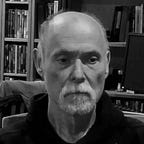No Reason to Cry
Inspired by Neil Young, “Expecting to Fly”
Here we wait at the end of forever
living through one more lie
We stand mute thinking that never
We would never know why
This is what we’ve done
All around us we were hearing
it would pass us by
All the fears the news were bringing
no reason to cry
No, no reason to cry
No, no reason to cry
When it came that day and found us
We had no place to hide
When we saw the world around us
at what cost our pride
Now that it’s gone
We hoped so long for tomorrow
but it just went by
We lived on things we could borrow
now we have to buy
Don’t, let me see you die
Don’t, let me see you die
Don’t
ChatGPT, 2/28/2023
The poem seems to be about the human experience of waiting for something that seems unattainable or unreachable, and the eventual realization that what we were waiting for may have been an illusion or a lie. The lines “Here we wait at the end of forever / living through one more lie” suggest a sense of disillusionment or disappointment, perhaps in relation to a particular belief or hope that has not been fulfilled.
The stanza “All around us we were hearing / it would pass us by / All the fears the news were bringing / no reason to cry” could be referring to a time of uncertainty or fear, where people were told that a difficult situation would eventually pass and there was no need to worry excessively. The repetition of the phrase “No, no reason to cry” seems to emphasize this idea of trying to remain calm and optimistic in the face of difficult circumstances.
However, the stanza “When it came that day and found us / We had no place to hide / When we saw the world around us / at what cost our pride / Now that it’s gone” suggests that eventually, the difficult situation did arrive and people were unable to escape its impact. The phrase “at what cost our pride” suggests that there may have been a sense of arrogance or overconfidence in the belief that the situation would pass, and now people are left to face the consequences.
The final stanza seems to express a sense of regret or sadness about missed opportunities and lost time. The line “I hoped so long for tomorrow / but it just went by” suggests a feeling of helplessness or powerlessness, as though time has slipped away without us being able to achieve what we had hoped for. The line “now I have to buy” could be interpreted as a reference to having to pay the price for our previous inaction or complacency.
The final lines “Don’t let me see you die / Don’t let me see you die / Don’t” suggest a plea or a sense of urgency, perhaps indicating a desire to avoid the negative consequences of the situation that has been described in the poem.
Overall, the poem seems to be exploring themes of disappointment, regret, and the human experience of waiting for something that may never come. The imagery and language used throughout the poem create a sense of uncertainty and tension, as though the speaker is grappling with difficult emotions and trying to make sense of their experiences.
